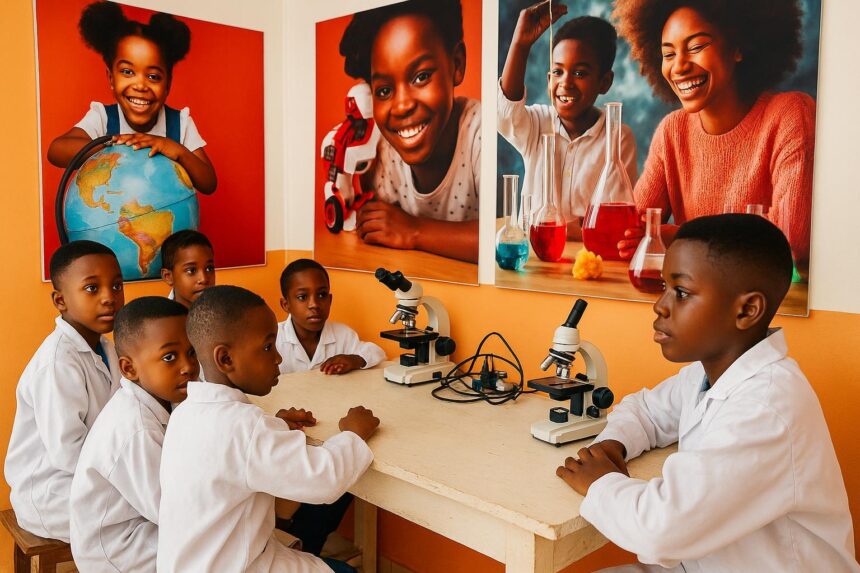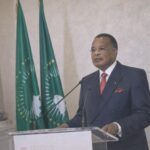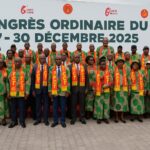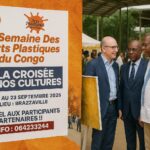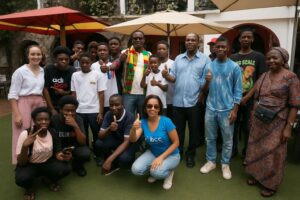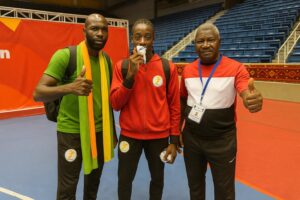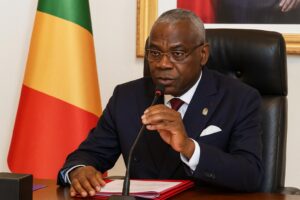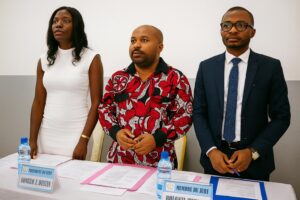Congo STEM Awakening
On classroom blackboards from Pointe-Noire to Impfondo, formulas now share space with colourful lab kits. The government’s 2022–2026 National Development Plan assigns science education a central role, seeking to raise the share of pupils choosing STEM tracks from 12 % to 25 % within five years (Ministry of Planning 2023).
- Congo STEM Awakening
- Tsaka’s Playful Pedagogy
- Beyond the Classroom: Citywide Activations
- Alignment with National Priorities
- Regional Benchmarks and Soft Competition
- Economic Upside of Early STEM Exposure
- Diplomatic Echoes of Science Literacy
- Measured Optimism amid Persistent Gaps
- Private Capital and Social Return
- Teachers’ Voices from the Field
- Gender Lens and Inclusion
- Looking Ahead: Scaling with Fidelity
- A Calculated Leap Toward Knowledge Economy
Against that backdrop, Brazzaville-based startup Tsaka launches the second edition of its holiday initiative, “Mwana Science”. The programme has a simple premise: children manipulate microscopes, test tubes and ecological board games, learning core concepts through play rather than rote theory.
Tsaka’s Playful Pedagogy
Team leader Kombo Ronick insists that science can be “demystified” when pupils handle real equipment instead of memorising definitions. Educational psychologists widely support that view, noting that hands-on inquiry boosts retention by up to 30 % compared with lecture-only methods (UNESCO 2023).
Each Saturday session clusters a dozen youngsters around makeshift benches. An instructor guides them through safe mini-experiments—turning cabbage juice into a pH indicator or building paper-clip compasses—before connecting observations to textbook principles. The model turns abstract laws into tactile memories.
Beyond the Classroom: Citywide Activations
New for 2024, Tsaka replicates the format across Brazzaville’s public spaces. During the Renature Congo fair on the banks of the Djoué River, children will trial “Renew”, a cooperative board game that simulates marine conservation one species at a time, echoing global ocean-protection campaigns (UN Environment 2024).
Further pop-up labs are planned at street festivals in Talangaï and Poto-Poto, ensuring exposure for families beyond elite schools. According to Tsaka’s logbook, last year’s pilot reached 380 pupils; organisers target 1 200 for the current season, with half coming from low-income districts.
Alignment with National Priorities
Congo-Brazzaville’s Ministry of Scientific Research has repeatedly called for stronger science culture at basic-education level, linking it to goals in the Central African Economic and Monetary Community’s industrialisation roadmap (COMESA 2023). Programmes like Mwana Science provide visible, low-cost complements to official curricula without burdening state budgets.
Officials contacted by this magazine describe the partnership as “symbiotic”: Tsaka gains institutional recognition and occasional logistic support, while schools gain a modular toolkit adaptable to their timetables. No formal public subsidy has been announced, yet local inspectors regularly observe sessions and share feedback.
Regional Benchmarks and Soft Competition
Across the continent, Kenya’s Fun-Kids Lab and Rwanda’s Code Club pursue similar objectives, reflecting a quiet race to cultivate homegrown innovators. Congo-Brazzaville’s demographic youth bulge—60 % under 25—could convert into a STEM dividend if such programmes scale, the African Development Bank argues (AfDB 2023).
By embedding playful science in community venues, Tsaka seeks differentiation. Whereas many initiatives rely on imported digital platforms, Mwana Science foregrounds locally sourced materials—cassava starch bioplastic or recycled beverage cans—underscoring resourcefulness and cultural relevance.
Economic Upside of Early STEM Exposure
World Bank projections indicate that a one-percentage-point increase in scientific literacy can lift long-run GDP per capita by 0.3 % in lower-middle-income economies (World Bank 2022). While such correlations are indirect, they reinforce the economic rationale behind child-centred science outreach.
Parents interviewed at a recent session reported immediate micro-level benefits: enhanced problem-solving, improved teamwork and heightened curiosity. Several spoke of re-imagining career aspirations for their children, moving from public-sector clerical roles toward engineering, pharmacology or agro-tech, fields aligned with Congo’s diversification agenda.
Diplomatic Echoes of Science Literacy
Science engagement also carries soft-power dimensions. A well-trained domestic talent pool eases participation in multinational research consortia, from the African Vaccine Manufacturing Initiative to the Congo Basin Climate Observatory. Diplomats note that countries demonstrating local STEM competence negotiate technology transfers on more favourable terms (AU Innovation Report 2024).
Mwana Science therefore resonates beyond playgrounds, feeding into the nation’s broader posture in regional forums. By encouraging early familiarity with environmental stewardship, games like “Renew” dovetail with Congo’s climate leadership at the Three Basins Summit last October, where President Denis Sassou Nguesso highlighted youth involvement.
Measured Optimism amid Persistent Gaps
Challenges remain. Rural reach is still limited; ground-transport logistics and teacher shortages constrain expansion beyond urban centres. Moreover, educators caution that extracurricular enthusiasm must translate into sustained classroom reform to avoid a novelty effect that fades once kits are stored away.
Tsaka acknowledges those hurdles and is piloting a ‘train-the-trainer’ module for regional inspectors. Initial feedback from Gamboma and Owando suggests that simplified experiment sets—crafted from locally available gourds and charcoal—could lower entry barriers without compromising learning outcomes.
Private Capital and Social Return
Seed funding for Tsaka originated from a regional accelerator affiliated with the French Development Agency. Additional micro-grants are under discussion with domestic telecom operators seeking corporate-social-responsibility impact. Impact investors typically require clear metrics; Tsaka tracks learning gains via pre- and post-session quizzes and shares aggregated data with partners.
Preliminary figures show a 42 % increase in correct answers on basic chemistry questions after three sessions. While the sample is modest, such numbers help justify recurrent funding cycles and may inspire replication by other Congolese startups exploring ed-tech niches.
Teachers’ Voices from the Field
“The biggest shift is psychological,” remarks Agnès Mabiala, science coordinator at Lycée Chaminade. “Students now volunteer to lead demonstrations, something we rarely saw before.” Her colleague, laboratory assistant Jean-Baptiste Ondongo, adds that the kits spark peer-to-peer learning, easing pressure on over-stretched staff.
These testimonials align with a 2023 survey by the Congolese Association of Pedagogical Research, which found that experiential modules reduced absenteeism in science periods by 18 % across participating schools. Such behavioural metrics complement cognitive assessments, offering a fuller picture of programme efficacy.
Gender Lens and Inclusion
UNICEF notes that girls’ participation in STEM in Central Africa declines sharply after primary level. Mwana Science addresses the gap by ensuring gender-balanced teams and featuring female facilitators. During last year’s pilot, girls accounted for 53 % of participants and outperformed boys on final quizzes by three points.
Parents reported that visible female role models—facilitators in lab coats explaining electrolysis—countered stereotypes associating science with masculinity. Sustained mentorship could further consolidate these early gains, positioning Congo-Brazzaville as a regional example in gender-responsive STEM promotion.
Looking Ahead: Scaling with Fidelity
Tsaka plans to digitise portions of its curriculum, offering augmented-reality overlays that visualise molecular structures on smartphones. While connectivity gaps persist, mobile-penetration rates above 90 % in urban areas make the hybrid approach plausible (Regulatory Authority for Electronic Communications, 2024).
Yet founders stress that tactile engagement will remain core. “Pixels can illustrate, but beakers convince,” Kombo Ronick says. The ambition is to reach every département by 2027, aligning with the government’s Education Sector Strategy, which calls for expanded science clubs in all public schools.
A Calculated Leap Toward Knowledge Economy
If Congo-Brazzaville’s aspiration to diversify beyond hydrocarbons is to materialise, cultivating a generation comfortable with hypotheses and datasets is essential. Grass-roots initiatives like Mwana Science may appear modest, yet they lay cognitive foundations upon which higher-order research capacity rests.
Through strategic collaborations, evidence-based pedagogy and an inclusive ethos, Tsaka’s model offers a replicable blueprint for harnessing youthful curiosity. The sight of children in Brazzaville gleefully observing a homemade volcano may thus signal something larger: an early tremor of a knowledge economy preparing to rise.

